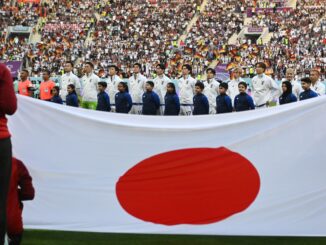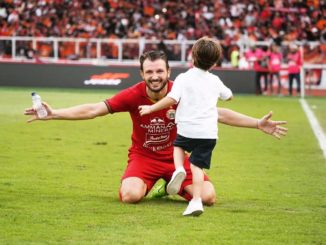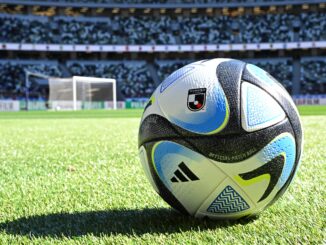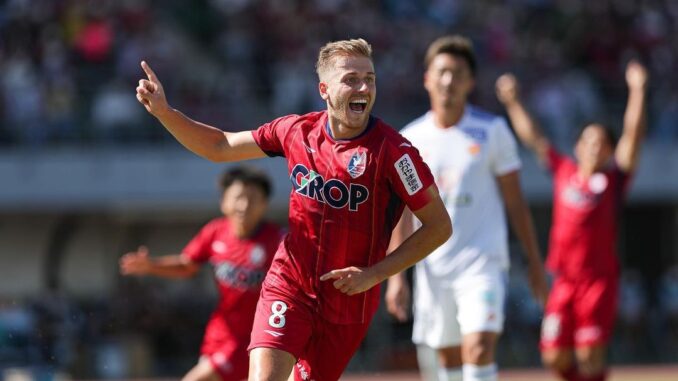
Okayama, nestled between Osaka and Hiroshima in central Japan, is a prefecture that’s far more often associated with one of the nation’s most beloved fables rather than its football team.
The story of Momotaro is one that every Japanese child knows where a young boy is found by an elderly couple floating down a river inside a peach; he then grows up and travels to foreign lands in the company of a talking dog, monkey and pheasant, slays the foreign demons, and returns home to great acclaim.
That underdog story is very much one that mirrors that of the local football club, J2’s Fagiano Okayama, who are in the midst of their best ever season and just three matches away from being promoted to J1 for the first time in their history.
A large part of the success this year is down to two Australian imports in the form of current Socceroo Mitch Duke and former Young Socceroo and Olyroo Stefan Mauk.
The Asian Game recently travelled to Okayama to catch up with Mauk where we spent the afternoon strolling the canals that line the city and threading the ties between the outsider tales of Momotaro and Fagiano Okayama, a club that, as Mauk, notes are in the midst of an historic season.
“When I first came I didn’t know what to expect,” Mauk reflected, “but as soon as I arrived a lot of the fans and the staff were always talking about how they wanted to fight to reach J1 given that we’ve invested a lot of money, there’s more foreign players that came in this year as well so everyone within the club and the fans specifically were aiming for that promotion.
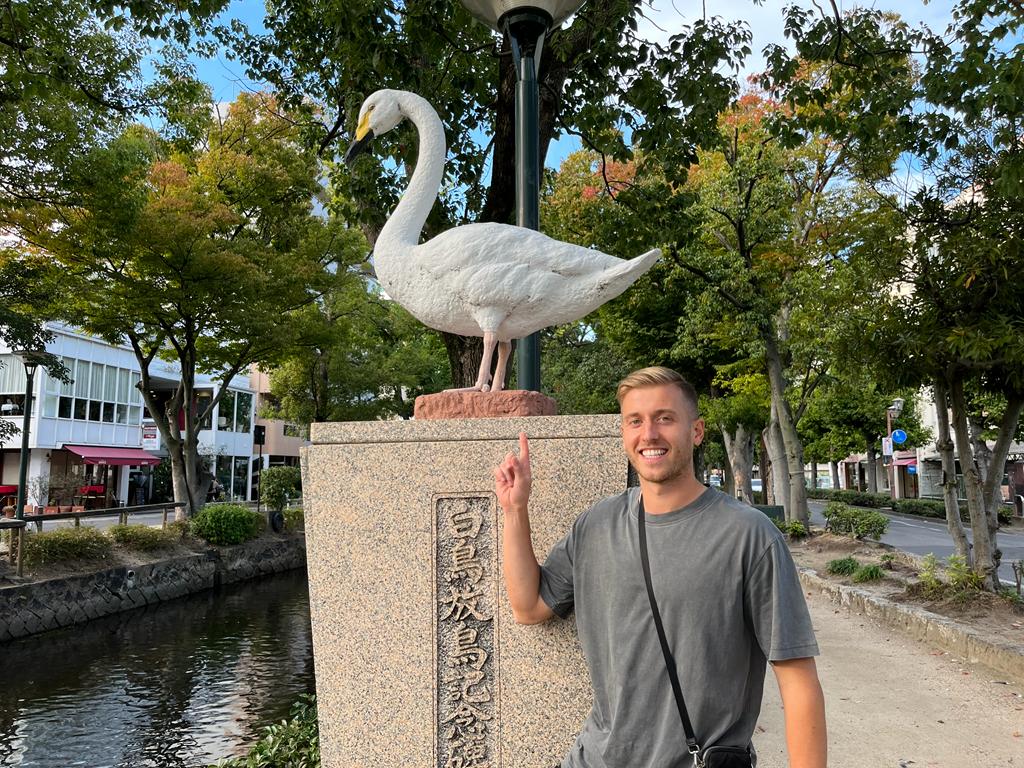
“I’m not sure what other clubs thought as to whether that was realistic or not but when I first got here I quickly realised it’s a very tough league with a lot of big clubs.
“I think that in the first half of the year we may have got lucky with some results but the longer that the year has gone and given we play a style which is very aggressive defensively we were able to catch a lot of teams out that want to overplay and we’ve finished third which is the best in the club’s history and we’ve done really well for a club of this size.”
That third-placed finish means that although Okayama missed out on the two direct promotion spots to the top flight they’re now entering a three-week playoff period that starts this week with a sudden death encounter against Montedio Yamagata, coached by a fellow Australian in Peter Cklamovski.
The format is a slightly unusual one in that the higher ranked team (Okayama in this case) has home advantage and only needs a draw to progress to the next round, but Mauk knows exactly what’s at stake for a club the size of Okayama that may not often get the chance to compete in the playoffs.
“Everybody realises that next year the teams that come down from J1 will be bigger and spend more money so it’s going to be even harder to go up, so this is a great opportunity for the club to get that first promotion to J1, especially with the way that the playoff system works.”
After a brief period in Holland five years ago, Mauk returned to Australia where he impressed in stints at Melbourne City, Brisbane and the Adelaide before realising his dream to again test himself abroad, but it was a rather inauspicious start at his new Japanese club where he was shown a harsh red card 13 minutes into his debut.
Since then though he’s become a regular in the Okayama midfield, operating as both a number eight and a number ten in Fagiano’s shifting tactical setup, featuring in 23 matches and notching four goals alongside his compatriot.
Oddly for a city the size of Okayama there’s also an Australian restaurant in town where a framed Socceroos shirt gifted by Duke takes centre stage and the achievements of his fellow Australian are a reminder as to where Mauk’s career could take him if he can continue to build on a solid first year in Japanese football.
“That was one of the reasons I wanted to come here to put myself in the shop window where you’re playing more games and it’s more competitive and if we go to J1 it’ll be even more competitive,” Mauk said.
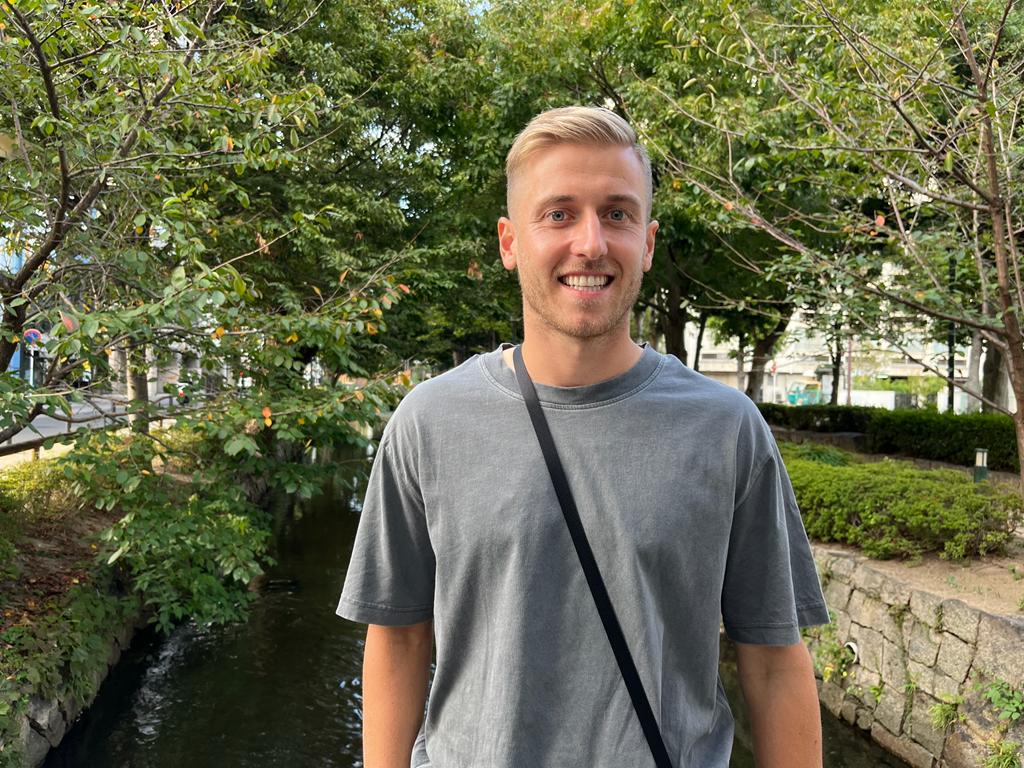
“Any Australian player in J1 should be in the Socceroos frame because of how tough that league is and for me, just as with any other Australian player, I have aspirations to play for the national team, I’m 27 so I’m still young enough and hopefully if I put another good season together I’ll be there or thereabouts.”
What Mauk brings to Okayama, along with his work off the ball, is a pure technique that’s not often found in young Australian players and he sees parallels with his unusual football education in Australia and that of young Japanese players.
“I didn’t get into club football until I was ten and even then I was only training two nights a week until I was 14 so I didn’t have what you would call a traditional upbringing for an elite footballer,” he explained.
“What I did do though was that I was always around the ball at home, dribbling from the lounge room to the kitchen or playing in the hallway, with my brother or friends in the backyard with the trampoline as a goal, that was where I learnt my trade as well as watching a lot of football .
“Here you see the young Japanese players are always playing in the park on the gravel, rather than grass, and then they play a lot at school and I think that’s one of the reasons why it’s a growing nation in football and why they’ve gone past Australia in the development of kids and the number of players they have playing at a good level overseas.”
Along with that unorthodox upbringing on the pitch, away from it Mauk is also not your average footballer.
He’s made time to attempt to learn Japanese – an effort not many foreign players make in Japan – and has already started a range of business ventures, with an eye to when his career ends, including launching an app, the Inner Game, that helps athletes understand themselves and their performance through a range of daily assessments.
For now though the focus is very much on ensuring the next three weeks lead to a crowning achievement for an Okayama side that were formed from the embers of what’s now Vissel Kobe and that starts with a clash against Cklamovski’s Yamagata side this weekend.
“It’s very tough, all the teams within the playoffs are strong but we match up better when teams want to play against us and we’ve beaten Yamagata all three times we played them (including a rematch of a partially postponed match) this season so we’re quite confident if we play our best football we’ll be able to beat those teams.
“Equally, there’s a lot more that goes into it with the emotions and the nerves and so many different factors so we need to make sure we give ourselves the best chance to get to that final playoff match against the J1 team but we know that if we play to our strengths we can beat any team.”
Those strengths may not include the talking dog, the monkey and the pheasant that Momotaro had, but if their Australian attacking duo click it could well be an equally notable ending to a season of great success.
PHOTO: Instagram/stefanmauk
Listen to The Asian Game Podcast as Scott visits Okayama to meet up with Stefan Mauk


